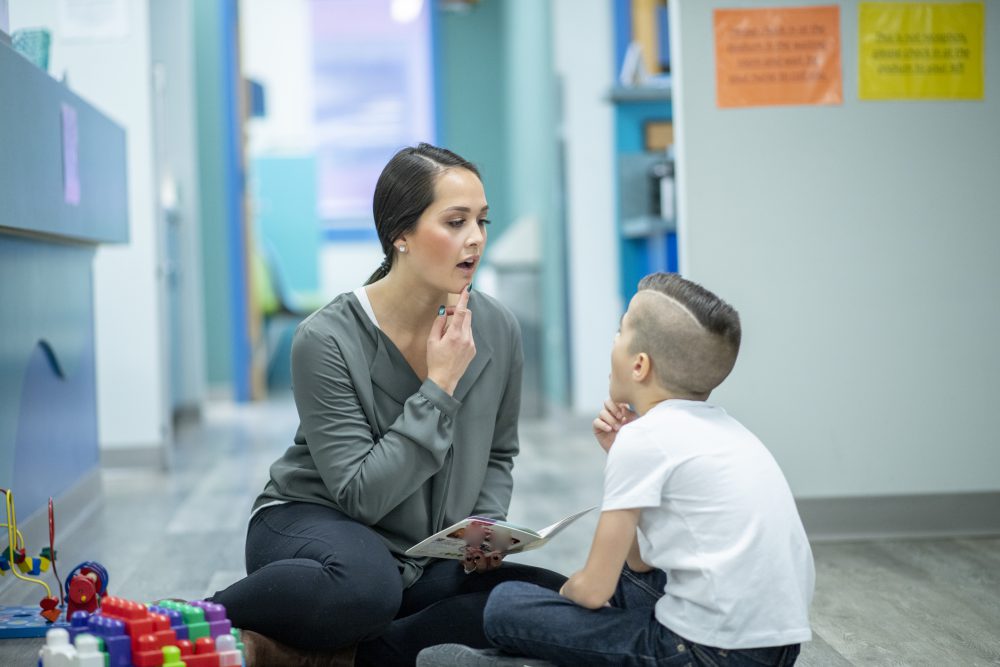The Importance of a Speech Pathologist in Early Childhood Development
The Importance of a Speech Pathologist in Early Childhood Development
Blog Article
Exactly How a Speech Pathologist Can Assist Improve Communication Skills
Effective communication is a foundation of specialist and personal success, yet many individuals face difficulties that hinder their ability to express themselves plainly. A speech pathologist is outfitted to resolve these obstacles with targeted evaluation and intervention strategies customized to each individual's needs. By employing evidence-based therapeutic techniques, they not only function to boost speech and language conditions but also boost overall communicative competence. Recognizing the complex function of a speech pathologist reveals just how their experience can change lives, inviting a more detailed examination of the specific approaches and results associated with their technique.
Comprehending Communication Problems
Understanding interaction problems is necessary for recognizing exactly how they impact individuals' capacity to reveal themselves and involve with others. Communication problems encompass a vast array of difficulties that affect speech, language, and social communication, commonly impeding effective communication. These conditions can occur from various variables, including neurological problems, developmental hold-ups, physical problems, or psychological issues.
Speech conditions may materialize as troubles in fluency, voice, or articulation manufacturing, influencing how words are noticable or spoken. Language conditions, on the various other hand, involve challenges in understanding or making use of language, which can hamper both non-verbal and spoken communication. Social interaction disorders are identified by difficulties in the pragmatic elements of interaction, such as taking kip down conversation or understanding social hints.
The consequences of interaction conditions are profound, affecting not only the individual's capability to communicate feelings and ideas yet additionally their social relationships, instructional chances, and overall lifestyle. Recognition of these conditions can foster empathy and support, urging reliable techniques for interaction and involvement. Recognizing the complexities of communication disorders is a vital action towards promoting inclusivity and attending to the requirements of those affected.
Role of a Speech Pathologist
Speech pathologists often play an essential function in treating and diagnosing communication problems, using a series of evidence-based techniques customized to every person's demands. These experts collaborate with individuals throughout the life-span, from kids with speech hold-ups to grownups recuperating from strokes or stressful mind injuries. Their expertise encompasses a selection of interaction concerns, including expression, voice, fluency, and language disorders.
In healing settings, speech pathologists use organized treatments made to enhance communication abilities. They might apply approaches such as speech exercises, language games, and social interaction training to assist in renovations in receptive and expressive language abilities. Speech Pathologist. In addition, they educate clients and their families regarding reliable communication techniques and adaptive methods to navigate day-to-day communications
Beyond straight therapy, speech pathologists work together with various other health care instructors, professionals, and caretakers to make sure a comprehensive method to treatment. They advocate for clients by supplying sources and support, making it possible for people to achieve their interaction objectives and enhance their total top quality of life. As specialists in the field, speech pathologists are necessary in promoting effective communication, promoting freedom, and boosting social engagement for those with communication challenges.
Evaluation and Diagnosis Process
The evaluation and diagnosis process conducted by speech pathologists typically includes a detailed examination to recognize communication disorders accurately. This procedure begins with a detailed situation history, where the clinician collects pertinent details regarding the individual's clinical, instructional, and developing background. Comprehending the context of the person's interaction problems is important for an exact diagnosis.
Complying with the medical history, speech pathologists utilize informal analyses and standardized examinations to examine various facets of communication, including speech noise manufacturing, language understanding, meaningful language, and social interaction skills. These evaluations are customized to the individual's age and specific issues, offering valuable data for analysis.
Observation is additionally a crucial part of the analysis procedure, as it enables the medical professional to see firsthand how the specific connects in natural settings. In addition, meetings with member of the family and teachers can give understanding into the individual's communication difficulties reference across different environments.
When the examination is full, the speech pathologist synthesizes the findings to determine a medical diagnosis and suggest the original source proper treatments. This complete analysis procedure makes certain that people obtain targeted support customized to their one-of-a-kind communication needs, laying the foundation for efficient healing approaches.
Restorative Methods and Strategies
Various healing methods and strategies are used by speech pathologists to deal with a variety of interaction disorders properly. One widely utilized technique is expression treatment, which concentrates on correcting speech appears with repetition and aesthetic signs. This method is specifically advantageous for individuals with speech audio disorders.
Another reliable approach is language treatment, which enhances both meaningful and responsive language skills. This may entail interactive activities that advertise vocabulary growth, syntax understanding, and conversational skills. In addition, speech pathologists frequently utilize social abilities educating to enhance pragmatic language capacities, allowing individuals to navigate social interactions a lot more effectively.
Fluency shaping and stuttering modification strategies are especially made to help those experiencing fluency problems. These techniques help customers establish smoother speech patterns and take care of the physical and psychological elements of stuttering.
Moreover, augmentative and alternate communication (AAC) systems are used for people with serious communication impairments. These systems, which can consist of gestures, symbols, or digital gadgets, provide essential assistance for efficient communication.
Advantages of Speech Therapy

Additionally, speech treatment can help in developing vital listening and understanding abilities, promoting better communication in discussions. Individuals with cognitive-communication disorders can additionally benefit, as therapy concentrates on enhancing memory and problem-solving capacities, crucial for efficient communication.
An additional critical aspect is the the original source emotional assistance given during therapy sessions. Speech pathologists develop a risk-free environment, motivating clients to get rid of anxiety and disappointment pertaining to their interaction issues. This assistance can result in boosted self-esteem and total mental health.
In addition, very early treatment with speech treatment can avoid more problems, making certain that individuals reach their complete communicative potential. Generally, the benefits of speech treatment prolong past mere speech enhancement, favorably impacting different measurements of life for those affected by communication troubles.
Conclusion
In summary, speech pathologists play a vital role in attending to interaction disorders with analysis, diagnosis, and tailored restorative treatments. By using evidence-based techniques, these specialists enhance individuals' speech and language abilities, cultivating boosted clarity, fluency, and social interaction skills. The advantages of very early treatment emphasize the importance of looking for assistance from speech pathologists, as their know-how can significantly enhance communicative potential, eventually causing higher success in both individual and specialist rounds.

Speech pathologists regularly play an important function in treating and identifying interaction disorders, employing a variety of evidence-based strategies customized to each person's needs. As professionals in the area, speech pathologists are crucial in fostering effective communication, promoting self-reliance, and boosting social participation for those with communication challenges.

Report this page